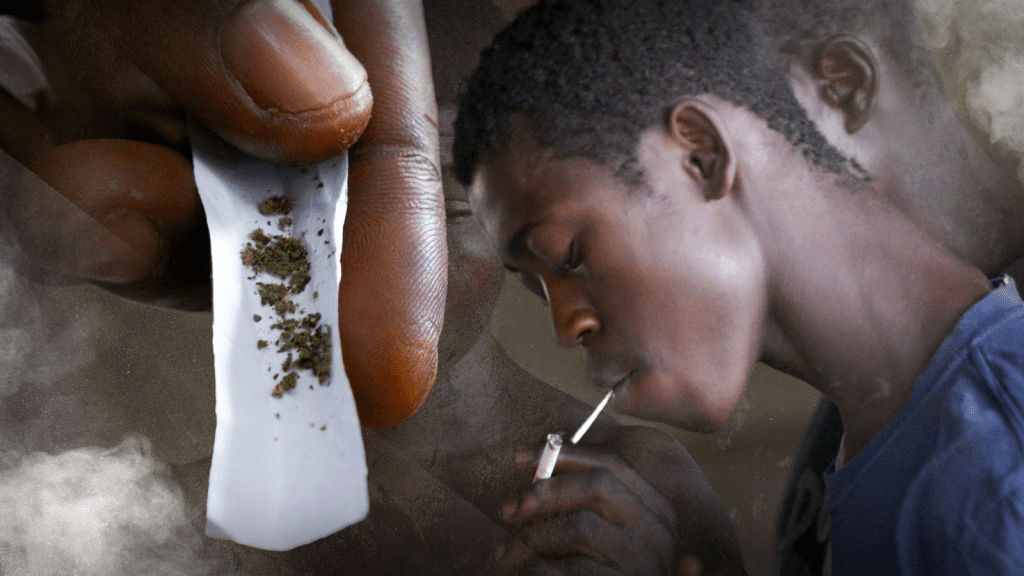Cliff Notes
- A red shipping container in Sierra Leone was seized containing suspected kush ingredients, which have been traced back to shipments from the UK, indicating a growing crisis of synthetic drug addiction in the region.
- Kush, a highly addictive drug that can contain nitazenes—25 times stronger than fentanyl—has led to severe health issues among users, with reports of infected sores and desperate living conditions for many in Freetown.
- The rise of kush addiction reflects broader challenges in West Africa, as local communities grapple with the impacts of poverty, unemployment, and a lack of effective rehabilitation services amid escalating drug trade networks.
Teens unable to walk, mothers with rash-covered babies: Kush is ruining lives – and made with ingredients shipped from the UK
A red shipping container sits on the tarmac of Sierra Leone’s Queen Elizabeth II Quay, under swinging cranes and towering stacks of similar steel boxes.
This one will likely be parked at the port permanently. The contents are suspected to be the ingredients of kush, the deadly synthetic drug ravaging Sierra Leone.
Sky News was given access to the container two weeks after it was seized.
“Preliminary testing has shown that these items are kush ingredients,” says the secretary of the Ports Authority, Martin George, as he points to the marked contraband in massive multicoloured Amazon UK bags and a large blue vat of strongly smelling acetone.
He adds: “Shipped from the United Kingdom.”
The container was selected for screening based on its origin. The UK is with the EU and South America on the list of places considered high risk for the import of illicit substances fuelling the drug trade in Sierra Leone and the region.
Kush has shaken this part of West Africa to its core – not just Sierra Leone but Liberia, Guinea, Guinea-Bissau and the Gambia. It is highly addictive, ever-evolving and affordable.
The sprayed grey-green marshmallow leaves are rolled in a joint like marijuana and are extremely dangerous. Samples of the drug tested by researchers contained nitazens, one of the deadliest synthetic drugs in the world.
“It was a shock to find them in around half of the kush samples we tested, as at that point there was no public evidence they had reached Africa,” says Lucia Bird Ruiz-Benitez de Lugo from Global Initiative Against Transnational Organised Crime (GI-TOC) who independently tested kush from Sierra Leone.
“Nitazenes are among the deadliest drugs available on retail drug markets across the world – with one nitazene in kush in Freetown being 25 times stronger than fentanyl,” she added.
The shocking effects of its potency can be seen on the bodies of young men and women around Freetown. Teenagers with sores eating away at their legs, unable to walk. Mothers who smoked during pregnancy carrying sickly rash-covered infants. Young men drooling from the intense high and slumped over while still standing.
They are not the fringes of Sierra Leonean society but a growing demographic of kush users searching for an escape. People riddled by poverty and unemployment, living in the dark corners of a capital city which has endured a brutal civil war and Ebola epidemic in the last three decades alone.
An entire community of men and women of all ages is held together by kush addiction under a main road that cuts through the heart of Freetown.
They call themselves the “Under de Bridge family” and live in the shadows of the overpass, surrounded by the sewage and rubbish discarded by their neighbours.
One of them tells us the harsh conditions drive him to keep smoking kush even after losing more than 10 friends to the drug – killed by large infected sores and malnutrition.
Nearby, 17-year-old Ibrahim is pained by growing sores and says the drug is destroying his life.
“This drug is evil. This drug is bad. I don’t know why they gave me this drug in this country. Our brothers are suffering. Some are dying, some have sores on their feet. This drug brings destruction,” he says.
“Look at me – just because of this drug. I have sores on my feet.”
Across a stream of sewage, a young mother expecting her second child cries from fear and anguish when I ask her about the risk of smoking while pregnant.
“Yes, I know the risk,” Elizabeth says, nodding.
“I’ll keep smoking while I live here but I have nowhere else to go. It helps me forget my worries and challenges.”
Life under the bridge is disrupted from its sleepiness by a yell. A plain-clothed police officer is chasing a child accused of selling kush.
The lucrative industry is absorbing all age groups and spreading rapidly to nearby countries – even passing through three different borders to reach the smallest nation in mainland Africa, The Gambia.


